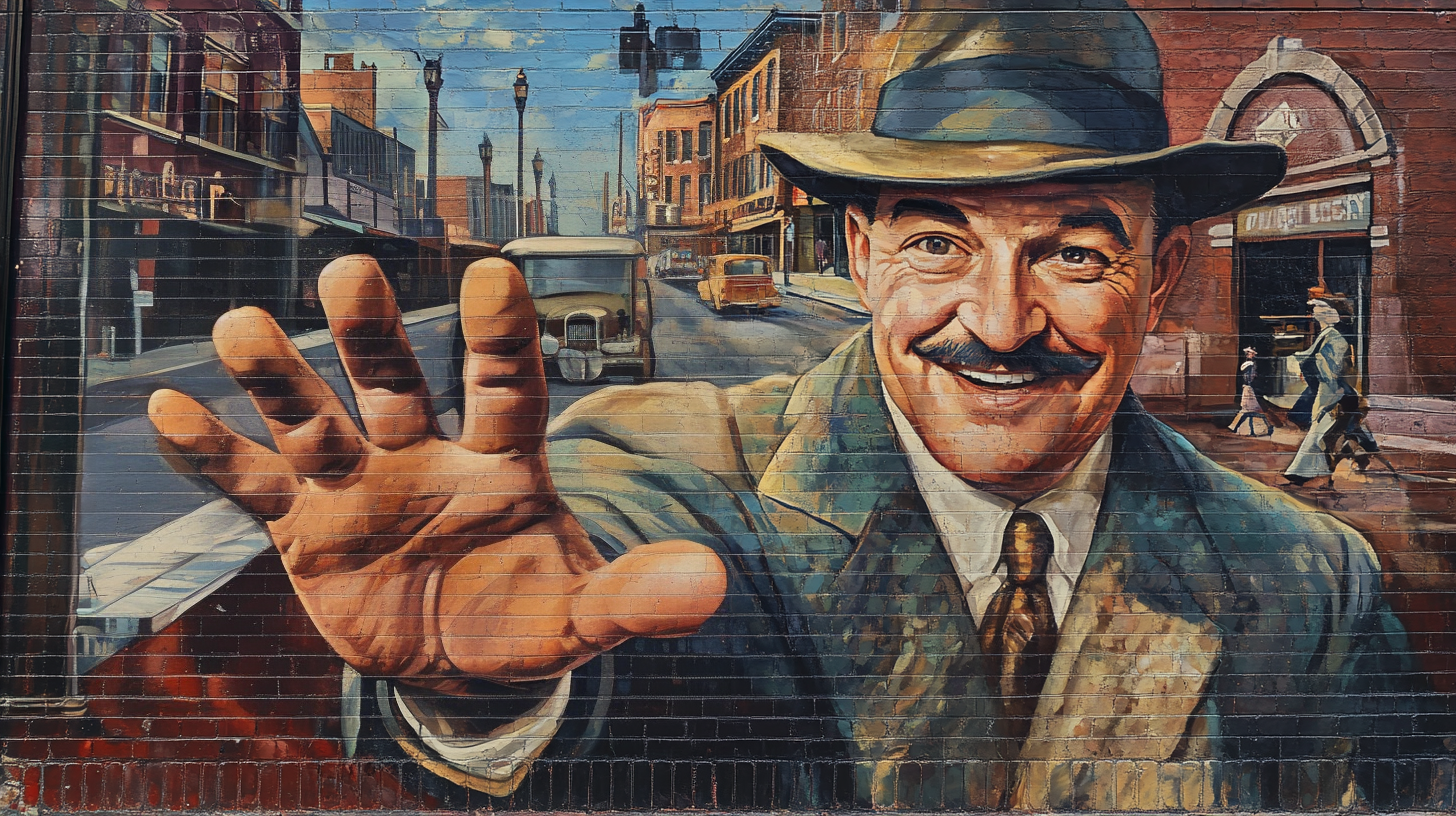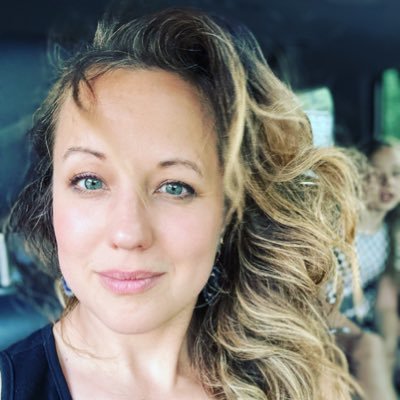
It started with the hands. Kara always sketched out her murals before she painted them. And this one, she needed to get just right. The hands would welcome new visitors to the area. Everything else in her sketch was perfect. So perfect that she had already begun painting them, but Kara never thought the hands were good enough. Something about them wasn’t quite right. She’d spent hours in her studio above The Downtown Bakery on Fourth Street, sketching and sketching, erasing, and crossing out, starting over. The hands needed to look just right. They needed to look like they could build things or play catch or lift a child into the air. But they just looked stiff.
Maybe that was why she noticed him.
The mural had begun like all the others that Kara had updated, or painted as originals around Steubenville, “the town of murals” as it advertised itself sometime in decades past. She had loved maintaining the old murals, like the one of the old steel mill where her grandpa once worked, or of the steamboats that floated down the Ohio River, or a forgotten Market Street that bustled with activity.
This time around, she was painting an original street scene from the 1950s. A welcoming man was in the foreground, turning as if to greet someone. Kara hadn’t planned on putting him there; that’s not where he was in her sketch, but there were times when Kara felt her brush move before her mind caught up like the wall itself whispered what it wanted to be. In moments when inspiration hit her so strongly, she couldn’t say no. As she painted, it was like the figure was guiding her. He knew where he wanted to be, the posture of his shoulders, the smile on his face, and the position of his hands. The hands that Kara had been practicing, sketching over and over, the ones she could never get right. But after all that sketching, here they were, painted on the wall, absolutely perfect.
The position of the fingers was just right, the hand, reaching out welcoming the viewer into his world, matching his kind face.
There was something familiar about it too. Kara couldn’t recall ever meeting someone who looked like this, but he had a twinkle in his eye with a tilted fedora drawing you to look more deeply at his face.
“There you are,” Kara said to the painting. That would be enough for tonight. The sun was getting dim, the sky filled with pinks and oranges, and it was like the whole world was celebrating the mural with her. Kara snapped a picture of the mural, packed up her paints, rolled the windows down in her car, and took in the warm, early summer air.
The next morning, she excitedly made her way back to finish the mural. But everything changed when she stood in front of her masterpiece. He had moved. She was sure of it. She grabbed her phone out of her pocket, pulling up yesterday’s photo. The difference was subtle but unmistakable. His smile was a bit wider, and instead of a welcoming hand, it was a waving hand.
“What is happening?” she wondered aloud. She continued working on the background, the bustling streets, the open markets. She was still happy with her work, but she wasn’t able to work at the same pace as she was the day before. She felt like an anxiety was stirring her to be somewhere else. She worked until dusk, with what felt like days more work ahead of her as she packed up her supplies for the weekend, happy to have a break before the mural was complete.
Kara was a habitual creature, and part of her routine was going to the library every Saturday morning. She was particularly excited to go this Saturday because she had included a painting of the old library in her mural and couldn’t wait to show Mrs. Rogers, the elderly town librarian who had shared stories and photos from “the good old days when people walked to the library.” She found Mrs. Rogers in the genealogy section, as usual. “I finally finished the library section,” Kara said, pulling up a photo of the mural on her phone. “What do you think?” “Oh my!” Mrs. Rogers exclaimed when she saw the image. “That looks just like Stanley Blackburn! He was our town’s most famous librarian back then. Legend has it that he hid a special time capsule somewhere in the old library before they tore it down. It was never found.”
“Stanley?” Kara whispered.
“Yes, he always wore his fedora tilted like that. Everyone loved him. He believed in the power of stories to keep us immortal.” After promising to return the following week with a print of the mural, Kara left with a driving sense of purpose. Despite her resolve to take the weekend off, she hurried back to the mural. To her astonishment, Stanley had moved again. Now he was angled differently, toward the old library in the back of the mural. “Are you trying to tell me something, Stanley?” Kara asked.
She could’ve sworn that Stanley’s eyes twinkled in response. And when she looked more closely, it was as if his hand was pointing to a specific brick in the old library wall.
“Well, I guess we’re about to take a detour.” Kara snapped a picture of the mural and made her way to where the old library once stood. The brick Stanley was pointing to appeared to be on the side of the library’s foundation, just under a window. Kara wasn’t one for conspiracies and magic, but she knew she was being summoned.
The real building was long gone, replaced by the drab office complexes popular in the 1980s, but maybe it was there somewhere.
By noon, she stood at the edge of the parking lot, tracing the shape of the old library in her mind. A few neighborhood kids stopped to see what this strange woman was doing in the parking lot.
“Watcha looking for?” the brave one called over.
“A brick,” Kara said without caring how ridiculous that sounded while she was staring at a five-story brick building. It must’ve been a boring Saturday because the kids pedaled over to her to help her find the brick.
With the help of some neighborhood kids, and some enthusiastic digging, they uncovered a loose brick exactly where Stanley had been pointing. It shifted as Kara reached for it. She gently pulled it out and discovered a metal box behind it.
She wasn’t going to wait to open it. Sitting cross-legged in the parking lot, she tore it open, surrounded by the curious kids and the afternoon sun. Inside, were dozens of children’s stories signed by Stanley Blackburn accompanied by photos of old Steubenville, letters, newspaper clippings, and a worn leather journal.
Kara carefully opened it. On the first page, written in neat cursive, was the story, “A Friendly Mural.” Her eyes widened.
It was a story about a town librarian who loved stories so much that he found a way to continue being a part of them, even after he was gone.
At the end, Stanley had written, “Maybe someday, someone will paint me into one of our town’s murals, and I can help them to find this very book that you’re reading.”
“I guess I found you,” Kara whispered. When Kara went back to the mural, Stanley was no longer pointing. He was exactly as she had initially painted him, warm smile, fedora tilted, hand reaching out in welcome. She traced her finger along the mural’s edge. Stanley had passed her more than just a story. He taught her how to paint hands that could welcome, how to paint stories not from what she saw but from what needed to be remembered, stories that were lost in forgotten corners waiting to be uncovered, to come alive.
